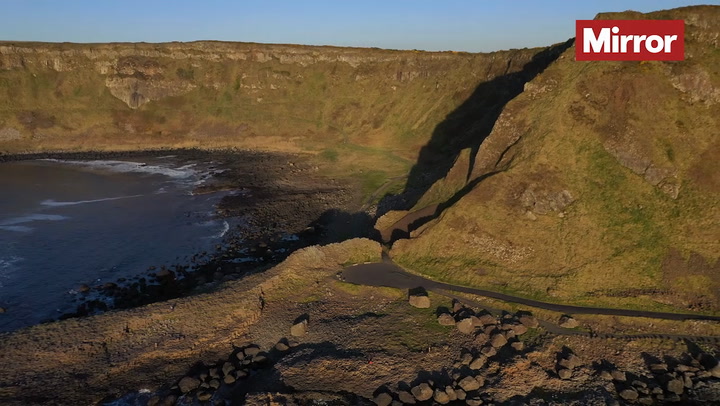The ambitious Blue Food Assessment plan has been drawn up by an international team of more than 100 experts who are calling for countries to develop their blue food sector to ‘provide ecological, economic, and health benefits’

Video Unavailable
Vanishing UK: A look at some of the places we could lose
Eating more fish could save the planet, according to new research.
Scientists are calling for a ‘blue food revolution’ to beat climate change.
It involves doubling global consumption of aquatic produce.
Some is more nutritious than beef, lamb, goat, chicken or pork.
Fish farms out at sea would feed the world’s growing population.
Plants and algae from freshwater and marine environments also boost diets.
The ambitious Blue Food Assessment (BFA) plan has been drawn up by an international team of more than 100 experts.
Co-chair Professor Beatrice Crona, of the Stockholm Resilience Centre, said: “Blue foods are much more diverse than typically thought.
“So too are the many communities of small-scale fishers often overlooked despite providing most blue food people eat.”
CLICK HERE TO READ OUR INTERACTIVE FEATURE ON VANISHING UK
(
Image:
Getty Images/iStockphoto)
Levels of omega-3, vitamins A and B12, calcium, iodine, iron and zinc were assessed – from seaweed to salmon.
Co-chair Prof Rosamond Naylor, of Stanford University in California, said: “Few, if any, countries are developing their blue food sector to provide ecological, economic, and health benefits to its full potential.
“This assessment aims to provide the scientific foundation for decision-makers to evaluate trade-offs and implement solutions.
“They will make blue foods an instrumental part of an improved food system from local to global scales.”
Do you agree? Have your say in the comment section
The database profiled 3,753 types of food including fish, crustaceans, and algae.
It found the top seven categories of nutrient-rich animal foods are aquatic – including tuna, herring, shellfish, salmon and trout.
A mathematical model showed an 8 percent increase in production by 2030 would slash prices by a quarter.
It would also improve the diets of up to 166 million people – with benefits three times greater for women in low income countries.
The Mirror has joined forces with community television channel Together TV to hand out 50,000 packets of free basil seeds to readers.
The seed starter kits are being given away as part of a new Green Challenge to encourage more people to start growing more of their own food.
Along with your packet of basil you will receive tips on how to look after the plants and exclusive recipes using the herb from celebrity chef Rustie Lee.
Bake Off winner and presenter Nadiya Hussain and TV gardener Danny Clarke are also backing the Green Challenge.
Nadiya told the Mirror: “There is so much joy you can get from cooking, it’s good for the soul. The power it has to bring your family, friends, neighbours and community together to connect and share the delicious food you’ve made is the best.”
How to apply for your free seeds:
- Visit www.TogetherTV.com/GreenChallenge and fill out the online form
- By SMS: Text “Together” to 80800 for free followed by your full name
- Sending your full name, post address and phone number via letter to –
Together TV’s Green Challenge 24 Neal Street
London WC2H 9QW
Greenhouse gas emissions and pollution would also drop dramatically. Seaweeds and farmed shellfish like clams and oysters performed best.
Compared to chicken, trout has approximately 19 times more omega-3 fatty acids.
Oysters and mussels have 76 times more vitamin B-12 and five times more iron. Carps have nine times more calcium.
On average, the major species produced in aquaculture such as salmon and carp had environmental footprints comparable to chicken – the lowest-impact land meat.
(
Image:
Getty Images/EyeEm)
Get all the latest news straight to your inbox. Sign up to one of the Mirror’s newsletters
Sardines, anchovies, shellfish and seaweeds all already offer lower stressors than chicken.
The research also found blue food systems facing the highest risk from climate change are typically located where people rely on them most – and are least equipped to cope.
More than 2,500 species or species groups of fish, shellfish, aquatic plants and algae are caught or cultivated globally for food.
They provide livelihoods and incomes for more than 100 million people – and sustenance for one billion.
The findings are in five papers published in the journals Nature, Nature Food and Nature Communications.


